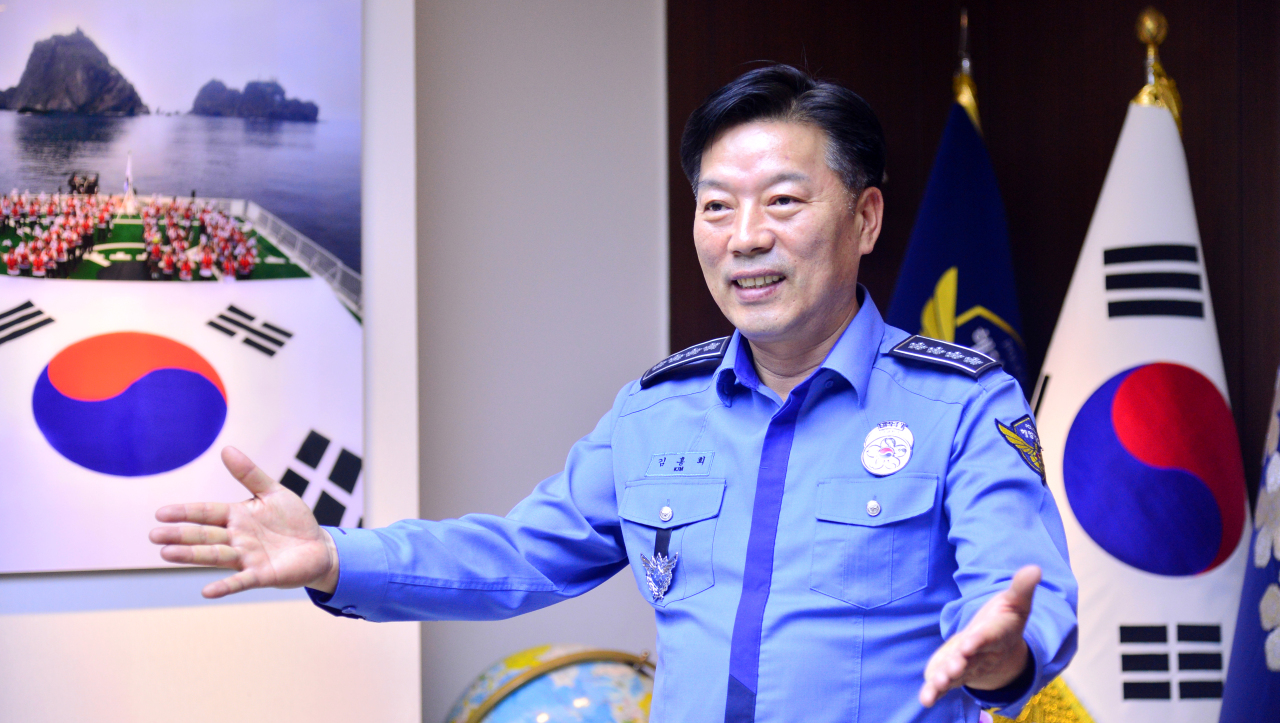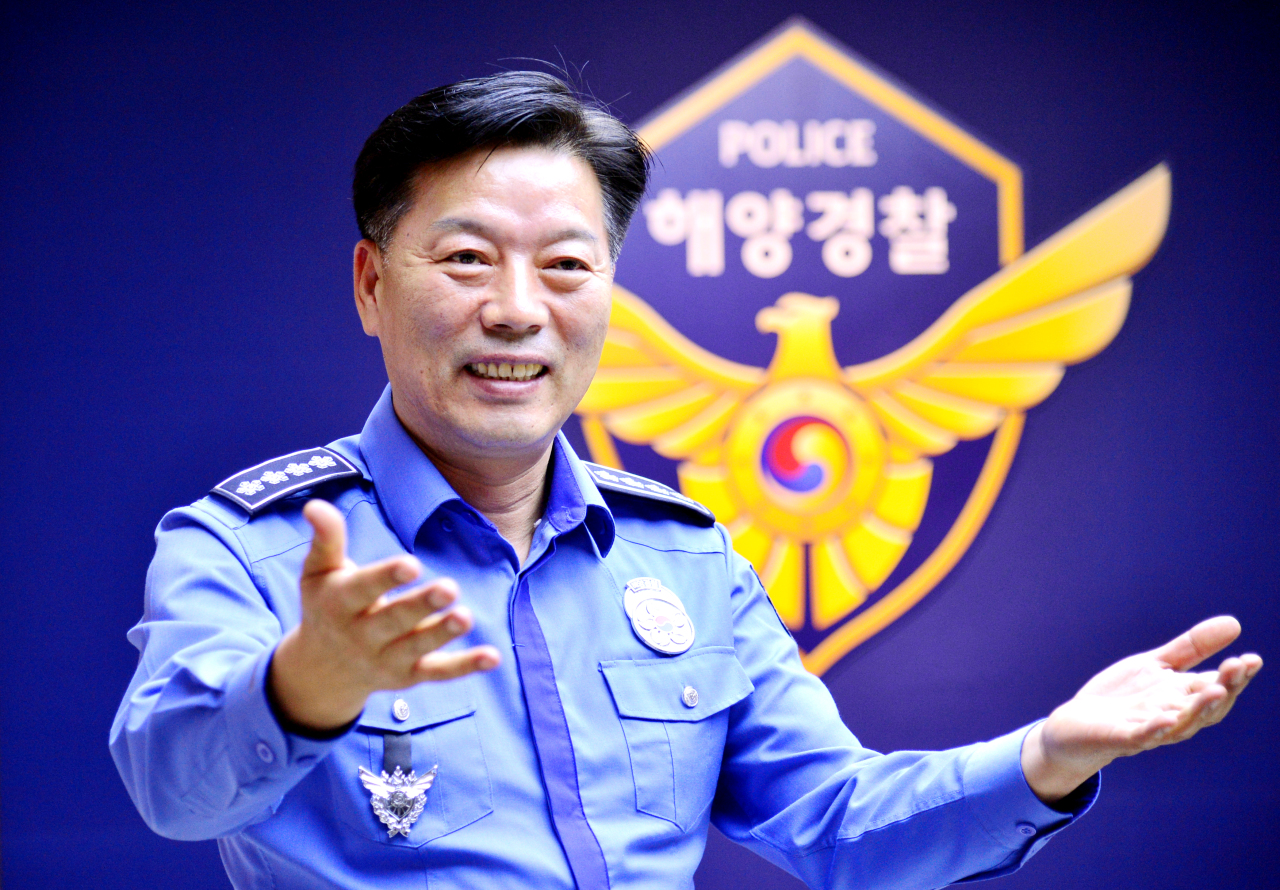
Kim Hong-hee (Park Hyun-koo/The Korea Herald)
INCHEON -- President Moon Jae-in was pinning high hopes on Kim Hong-hee when appointing the vigorous maritime police officer to be commissioner general of the Korea Coast Guard as part of a powerful reform drive. Moon promoted Kim by two ranks as part of a noteworthy personnel policy early this month.
Compared to his 16 predecessors, Kim, 52, is a relatively young chief of what is seen as the maritime police agency of South Korea.
“My life has been the continuation of challenges from the youth, staying away for many years from my parents. I believe the president acknowledged my firm resolve toward urgent necessity for reform (which will be another challenge for me),” he told The Korea Herald during an interview at the KCG headquarters in Songdo, Incheon.
Hinting that the reform would be another great challenge for him, the new commissioner general showed his unique affection toward the sea and residents including fishermen by commenting on his younger days in two southern coastal areas.
“I spent my childhood until 11 years old in Namhae-gun, South Gyeongsang Province with my parents, and studied in Busan from elementary school to university at my older sister’s or older brother’s homes,” he said. “I have witnessed a variety of difficulties held by the people residing in coastal villages.”
The Korea Coast Guard is striving to regain credibility among people by enhancing peninsular maritime safety. The agency was revived in July 2017 after suffering downsizing in organizational structure and demotion in public stature for several years.
In this context, staffers working for the KCG across the country have high expectations for 17th Commissioner General Kim Hong-hee, who took office on March 5.
Fourteen of the total 17 commissioners had worked for the land-based National Police Agency before being named the post. Further, among the other three, Kim marked the first, who had joined the maritime agency from the initial stage via regular recruitments.
“There is no time for being delighted by the restoration of the coast guard. It is time to faithfully obey orders from people to ensure the safety of people and the sea,” he said.
Kim expressed his commitment toward a structural overhaul, saying that he “would pay excruciating efforts to see the coast guard reborn as a revamped, upgraded entity to live up to public expectations.”
His ambition is in line with the past criticism of the agency for failing to carry out full-fledged rescue operations when the Sewol ferry was sinking in waters off the country’s southwestern coast on April 16, 2014.
The KCG underwent disbandment from November 2014 to July 2017 with its functions and government agency title being absorbed into the Ministry of Public Safety and Security (which is now defunct). Later, as part of President Moon’s policy to reorganize government agencies, the KCG recovered its former status, as a core government agency that belongs to the Ministry of Oceans and Fisheries.
Kim is planning to concentrate on fostering maritime policemen, who would play a conspicuous role in on-the-spot rescue and salvation activities.
“Turning from the former stance of prioritizing patrol activities, now we are intensively educating and training staffers who can reach the people cast away in the sea by one minute or one second faster as possible and save their lives.”

Kim Hong-hee (Park Hyun-koo/The Korea Herald)
He also said the agency was not sparing investments in futuristic devices, bracing for the “fourth industrial revolution.”
“We will actively utilize artificial satellites, drones and unmanned air vehicles for our operations in the coming years,” he said.
The KCG launched a preparation entity for a “smart coast guard” in August last year, with the aim of outstripping its Japanese counterpart in terms of state-of-the-art services ability.
Meanwhile, just after being named chief, Kim had to put more focus on taking emergency countermeasures against COVID-19. He said the agency “is alerted to the possibility that the novel coronavirus will spread via the marine routes during the process of its inspection into crews in foreign vessels.” In an attempt to minimize contagion risks, the agency has temporarily halted its seizure operations and is just deporting illegal boats.
The agency has also vitalized the international cooperation segment. “We are scheduled to provide Ecuador with two (large-scale) patrol ships in May for their guard activities around the Galapagos Islands,” he said. “On the back of the revised law, which took effect this month, the KCG is entitled to conduct support activities for more emerging nations.”
One of the core functions of the national maritime police is to settle fisheries industry disputes with China, whose large fishing vessels often threaten the KCG’s patrol boats as well as small local fishing boats.
Kim had already played a significant role in the government’s efforts to settle bilateral disputes. He studied the Chinese language himself for several months and garnered a master’s degree in law at a university in China, then later a doctorate in international maritime law at a university in Korea.
This academic career was part of his ongoing endeavors as a seaman from his younger days as well as dedication to his organization since being hired in April 1994.
During the interview, Kim served a cup of puer tea himself, saying that he became a devotee of the tea while studying in Shanghai.
“By the way, the puer tea prices have climbed much due to a TV program covering Lee Hyo-ri,” he said with a big smile, referring to the Korean singer, who was revealed to be an aficionado of the tea.
The headquarters of the Korea Coast Guard has jurisdiction over five bases nationwide -- the central regional coast guard (which controls five coast guard stations), western regional (five), southern regional (four), eastern regional (four) and Jeju regional (two). The 20 station units are located in cities including Incheon, Boryeong, Mokpo, Busan, Pohang, Sokcho and Seogwipo.
[Profile of Kim Hong-hee]
2020 Commissioner general of Korea Coast Guard
2018 Commander of southern regional coast guard
2016 Doctorate in international maritime law at Inha University
2011 Chief of Sokcho Coast Guard station
1994 Joined Korea Coast Guard in 42nd police cadet class
1968 Born in Namhae, South Gyeongsang Province
By Kim Yon-se (
kys@heraldcorp.com)







![[Graphic News] More Koreans say they plan long-distance trips this year](http://res.heraldm.com/phpwas/restmb_idxmake.php?idx=645&simg=/content/image/2024/04/17/20240417050828_0.gif&u=)